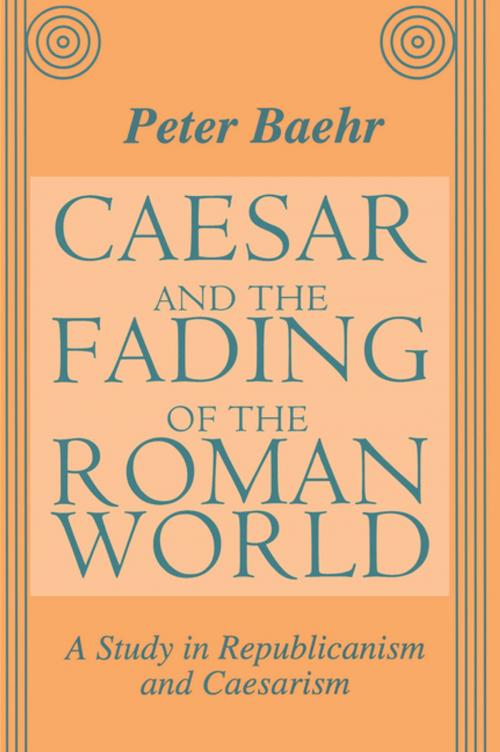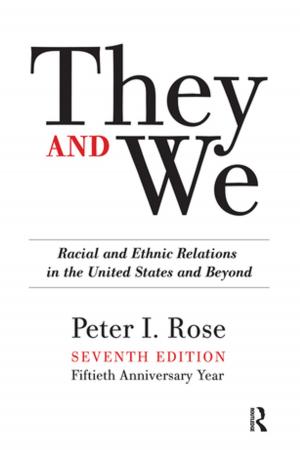Caesar and the Fading of the Roman World
A Study in Republicanism and Caesarism
Nonfiction, History, European General| Author: | ISBN: | 9781351291545 | |
| Publisher: | Taylor and Francis | Publication: | November 30, 2017 |
| Imprint: | Routledge | Language: | English |
| Author: | |
| ISBN: | 9781351291545 |
| Publisher: | Taylor and Francis |
| Publication: | November 30, 2017 |
| Imprint: | Routledge |
| Language: | English |
For many centuries, Julius Caesar was a name that evoked strong feelings among educated people. Some of these responses were complimentary, but others came from the point of view of "political republicanism"—which envisaged Caesar as a historical symbol for some of the most dangerous tendencies a polity could experience. Caesar represented everything that republicans detested—corruption, demagogy, usurpation—and as such, provided an antimodel against which genuine political virtue could be measured. Caesar and the Fading of the Roman World examines the reception of Caesar in republican thought until the late eighteenth century and his transformation in the nineteenth, when he enjoyed a major rehabilitation in the literary culture and historiography of the day.
Critical of hereditary monarchy and emphasizing the collective political obligations citizens owed to their city or commonwealth, republican thinkers sought to cultivate institutions and mores best adapted to self-governing liberty. The republican idiom became an integral element in the discourse of the American revolutionaries and constitution builders during the eighteenth century, and of their counterparts in France.
In the nineteenth century, Caesar enjoyed a major rehabilitation; from being a pariah, he was elevated in the writings of people like Byron, De Quincey, Mommsen, Froude, and Nietzsche to the greatest statesman of his age. Simultaneously, Caesar's name continued to function as a term of polemic in the emergence of a new debate on what came to be called "Caesarism." While the metamorphosis of Caesar's reputation is studied here as a process in its own right, it is also meant to highlight the increasing enfeeblement of the republican tradition. The transformation of Caesar's image is a sure sign of changes within the wider present-day political culture and evidence of the emergence of new problems and challenges.
Drawing on history, political theory, and sociology, Caesar and the Fading of the Roman World uses the image of Caesar as a way of interpreting broader political and cultural tendencies. Peter Baehr discusses the significance of living not in a postmodern society, but in a postclassical one in which ideas of political obligation have become increasingly emaciated and in which the theoretical resources for the care of our public world have become correspondingly scarce. This volume is an important study that will be of value to sociologists, political theorists, and historians.
For many centuries, Julius Caesar was a name that evoked strong feelings among educated people. Some of these responses were complimentary, but others came from the point of view of "political republicanism"—which envisaged Caesar as a historical symbol for some of the most dangerous tendencies a polity could experience. Caesar represented everything that republicans detested—corruption, demagogy, usurpation—and as such, provided an antimodel against which genuine political virtue could be measured. Caesar and the Fading of the Roman World examines the reception of Caesar in republican thought until the late eighteenth century and his transformation in the nineteenth, when he enjoyed a major rehabilitation in the literary culture and historiography of the day.
Critical of hereditary monarchy and emphasizing the collective political obligations citizens owed to their city or commonwealth, republican thinkers sought to cultivate institutions and mores best adapted to self-governing liberty. The republican idiom became an integral element in the discourse of the American revolutionaries and constitution builders during the eighteenth century, and of their counterparts in France.
In the nineteenth century, Caesar enjoyed a major rehabilitation; from being a pariah, he was elevated in the writings of people like Byron, De Quincey, Mommsen, Froude, and Nietzsche to the greatest statesman of his age. Simultaneously, Caesar's name continued to function as a term of polemic in the emergence of a new debate on what came to be called "Caesarism." While the metamorphosis of Caesar's reputation is studied here as a process in its own right, it is also meant to highlight the increasing enfeeblement of the republican tradition. The transformation of Caesar's image is a sure sign of changes within the wider present-day political culture and evidence of the emergence of new problems and challenges.
Drawing on history, political theory, and sociology, Caesar and the Fading of the Roman World uses the image of Caesar as a way of interpreting broader political and cultural tendencies. Peter Baehr discusses the significance of living not in a postmodern society, but in a postclassical one in which ideas of political obligation have become increasingly emaciated and in which the theoretical resources for the care of our public world have become correspondingly scarce. This volume is an important study that will be of value to sociologists, political theorists, and historians.















